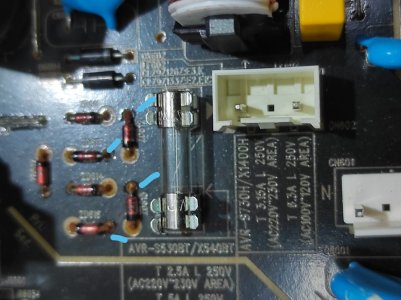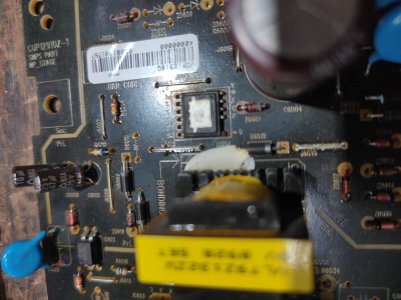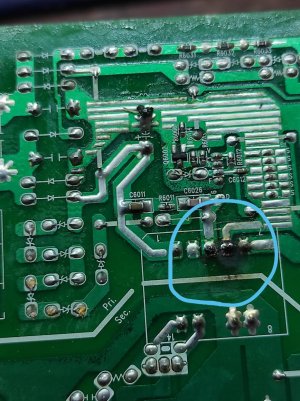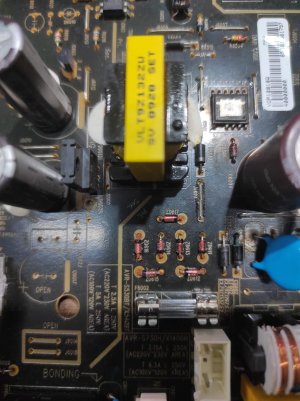You are using an out of date browser. It may not display this or other websites correctly.
You should upgrade or use an alternative browser.
You should upgrade or use an alternative browser.
How to prevent dust on Amplifier/AVR?
- Thread starter swamytk
- Start date
superczar
Well-Known Member
- Joined
- Feb 5, 2008
- Messages
- 836
- Points
- 93
I'd say stop worrying about dust.
Modern PCBs and components are fairly durable and if dust had been such an issue, devices with far more complex multi-layered circuit boards and components with much smaller solder pitches would not have lasted at all (think of your phone or the super tiny motherboards on ultra-portables)
Excessive dust accumulation, especially on heatsinks however does cause overheating issues but it takes a long time for that amount of dust to build up.
Having said that, it takes 15 minutes to open up an AVR cabinet once a year or so to lightly vaccum out the deposits.
Modern PCBs and components are fairly durable and if dust had been such an issue, devices with far more complex multi-layered circuit boards and components with much smaller solder pitches would not have lasted at all (think of your phone or the super tiny motherboards on ultra-portables)
Excessive dust accumulation, especially on heatsinks however does cause overheating issues but it takes a long time for that amount of dust to build up.
Having said that, it takes 15 minutes to open up an AVR cabinet once a year or so to lightly vaccum out the deposits.
hifitoaster
Well-Known Member
I have bought LOADS of used equipment which had more than 35 years of dust collected in them. So far I never encountered anything which was damaged by dust. After 30 years caps and other components can go wrong, which has nothing to do with dust. The components that need heat dissipation always will have the fins in vertical direction which prevents dust to collect on them affecting the performance. Rarely some dumb guy would put heatsink in a way to collect dust in horizontal position. I think dust on other components makes a good cover to isolate them from atmosphere even! Other than aesthetic reasons there is no reason for which an amp must be protected against dust. CD players lens, tape recorder heads and so on are a different story. There are lot of ways in which an amp can get damaged, dust hardly makes up to the list. Like I mentioned earlier, moisture can damage components, not sure about the most modern PCBs
It does make sense. Thanks for sharing.I have bought LOADS of used equipment which had more than 35 years of dust collected in them. So far I never encountered anything which was damaged by dust. After 30 years caps and other components can go wrong, which has nothing to do with dust. The components that need heat dissipation always will have the fins in vertical direction which prevents dust to collect on them affecting the performance. Rarely some dumb guy would put heatsink in a way to collect dust in horizontal position. I think dust on other components makes a good cover to isolate them from atmosphere even! Other than aesthetic reasons there is no reason for which an amp must be protected against dust. CD players lens, tape recorder heads and so on are a different story. There are lot of ways in which an amp can get damaged, dust hardly makes up to the list. Like I mentioned earlier, moisture can damage components, not sure about the most modern PCBs
hifitoaster
Well-Known Member
Thats a good idea, but silica gel has a shelf life and gets saturated faster if kept in a room, and to absorb the moisture around an amp u need hell lot of them considering the fact that u need 200gm of silica gel for every cubic meter u want to protect. In a closed container there is very limited humidity coming through. In a room, this is considerably high, which means the gels get into saturation faster and can no longer absorb moisture.I use silica gel packs around the electronics and it seems to work in preventing moisturisation.
By the way, I lived in Chennai for 5 years, in the last decade and moved to Kerala. Moisture in chennai is nothing compared to kerala(which is a really not a good thing!) My speakers started getting white patches of fungus, gold plated binding posts started getting greenish, copper wires which I though it were OFC started turning dark faster.. also in rainy season, u can feel the wetty feeling on surface of wood and metal. its a nightmare. My equipments started getting complaints after moving to kerala. So dont worry much about moisture in Chennai
sanjivnayak
Well-Known Member
You can use Air purifier when the components are in use. Very effective.
Ajesh
New Member
Hi , i am also living in kerala and what you have said has happened with me very recently. Due to moisture some components of the board is corroded. Technician sent me pics of the damage caused. I am using denon 250 bt. Moisture is a bigger worry now than the dust. I just stumbled upon ur comment. Can any one suggest any solution or precautions to be taken.From where I come(kerala) , in monsoon season, the moisture levels are very high that, wood on speakers get fungus, paper cones sometimes in some cases also get fungus. Technicians at our place always says that moisture can cause condensex droplets on legs or small microcontrollers causing them to short. In this case before the warming up happens damage will be done. Also certain inductors corrode exposed to moisture. I am not sure if they are right altogether ,but after having complaints with denon , onkyo receivers (always with small processors or components like that ) at kerala and never at Chennai where I previously worked I kind of believe them. Also, joints on boards can corrode and can there by altering the circuit leading to damage. I heard the same story from more than one technician.
Old stereo amps with mechanical switches seems alright in this case. Not 100 percent sure, as I am no expert with working on boards.
Attachments
Subbu68
Well-Known Member
Speakers are like furniture. I am also from Kerala and it is common for wood to develop fungus.My speakers started getting white patches of fungus, gold plated binding posts started getting greenish, copper wires which I though it were OFC started turning dark faster.. also in rainy season, u can feel the wetty feeling on surface of wood and metal. its a nightmare. My equipments started getting complaints after moving to kerala. So dont worry much about moisture in Chennai
IF "gold" plated terminals are turning green it is may be polished brass - you know how brass lamps develop patina (or klavu). Clean them up and give a coat of silicone grease. it is sticky but can prevent oxidation.
OFC will turn dark again due to patina formation on copper. Oxygen free does not mean it will not corrode. Oxygen is an impurity in copper and OFC has 0.01% oxygen and 99.99% copper. Humidity and air seep into the sheath of the cables and start eating the copper. Can prevent it to a large extent by using heat shrink sleeves at the ends of cables.
Using air conditioning is the only way to keep humidity at bay.
In summer when we leave on vacation we keep the a/c on in our houses in Abu Dhabi. Else you can return to have black walls. Just park your car at night outside and return in the morning to see it wet like it was in Kerala rains
Wharfedale Linton Heritage Speakers in Red Mahogany finish at a Special Offer Price. BUY now before the price increase.
Similar threads
- Replies
- 3
- Views
- 8K
- Replies
- 10
- Views
- 6K





